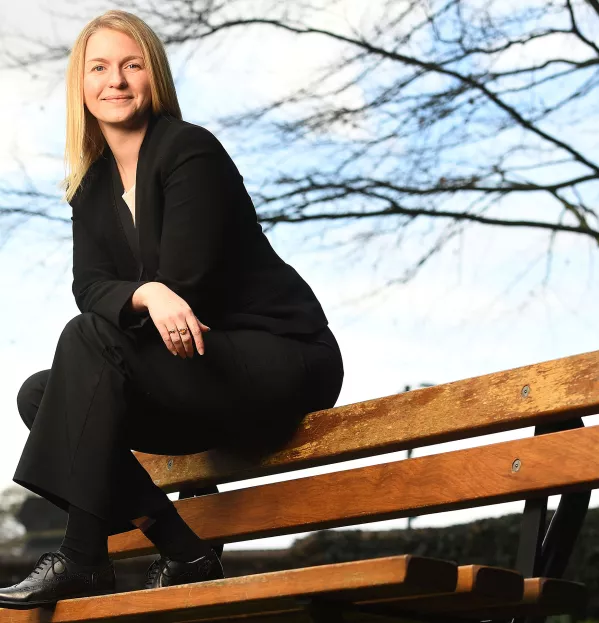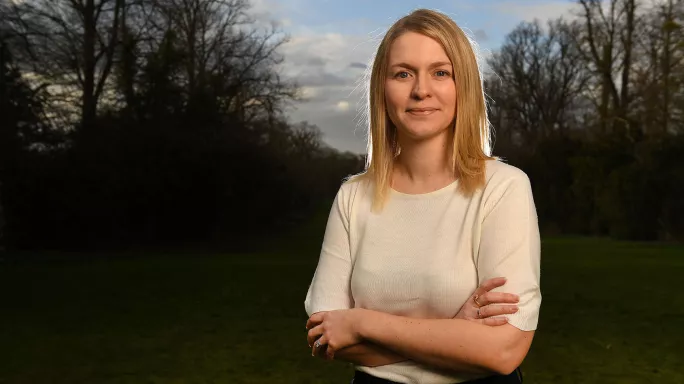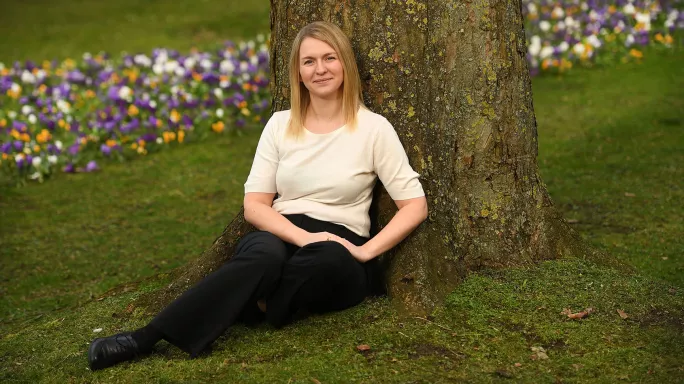10 questions with... Emma Hollis

Emma Hollis is the executive director of the National Association of School-Based Teacher Trainers (NASBTT).
Speaking to Tes for our 10 questions series, she reflects on the shrinking capacity in schools and her pride in the level of support her organisation has given to members over the last three years.
1. Who was your most memorable teacher and why?
My favourite teacher was my maths teacher, Mr Lockwood. He was funny and quirky and took a lot of abuse from us as teenagers. But when I look back, he took so much time to get to know each of us and how we work. For me, maths was not a strong point at that time. And he was the first maths teacher that ever made me feel like I could do it.
He used to take the time to get to know us as individuals and then respond to our needs as individuals.
2. What were the best and worst aspects of school?
I loved - and have always loved - learning. I loved English, I loved art, I loved history, they were the things I most enjoyed from an academic perspective.
I was a little bit of a geek (shocker!)…and so that didn’t always lead to the best experience with my peers.
I was identified as being academically bright so was moved up a year, which was great from an academic point of view, but socially, looking back, was probably the worst thing that could have happened because all of that geekiness that was inherent in me anyway was exacerbated by the fact that I’d been moved and was a year younger than everybody else.
I had loads of friends, I wasn’t bullied but I was slightly socially awkward and never quite fit with that peer group.
We lived in Spain and I was at an English international school so, although it was an English school, it was a different system to the one we have here.
3. Why do you work in education?
I’ve always had an affinity with education, but I didn’t start in education actually. When I finished school, I went to the University of Birmingham for a year and then for various reasons left and completed my degree through the Open University (OU). I needed to work and financially couldn’t really stay at a traditional university so I worked and did my degree through the OU, which was a brilliant experience and worked for me.
I ended up doing my degree in psychology with a focus on child development and I got a first-class honours degree so I was very proud of that.
When I had my daughter, I reassessed what I wanted to do and there was a big drive in Milton Keynes, where I was living, for a local graduate teacher programme, which was a paid way to work to teach.
I looked into that and trained to be a primary teacher, so that’s how I got into education after my daughter was born.

4. What are you proudest of in your career?
I think it is the level of support that NASBTT has been able to give to members through the last three years of turbulence with the pandemic and then the market review and policy changes.
When my predecessor Martin Thompson started, it was five people sat around a table, talking about the fact that they were doing this thing called skill-based training and perhaps we ought to meet every now and again to talk about what we do.
Now we’ve grown in terms of our team but we’re still a very small team.
Our members tell us in all of our surveys that we provide what they need at the right time and the support that we’ve been able to put together for them.
The fact that we’ve been able to be here for them...That’s an incredibly proud moment that, in the really toughest, darkest times, we’re here for people and have been able to provide that level of support, which wouldn’t come from anywhere else if we weren’t here.
5. What would your perfect staffroom look like?
My ideal staffroom would be one in which people are not feeling under incredible pressure. I think the realities of school, and the realities of everything that you have to do as a teacher, have got more and more pressured, over quite a significant period of time, but recently even more so.
So the ideal staffroom for me would be one in which teachers are able to laugh and relax and smile at one another, and share a bit of what they’ve done at the weekend, instead of moaning about the weight of responsibility on their shoulders.
Up and down the country at the moment, I think there are probably no teachers in the staffroom because they’re all at their desks marking and eating their sandwiches...the capacity issue in schools worries me on many, many levels.
6. What are the best and worst aspects of our school system?
I’ve very rarely come across somebody in education that doesn’t really want the very best for children in school. They might have different ideas about how to go about that and I don’t always agree with them, but on the whole, I don’t think I could point to anybody who at their heart doesn’t want what’s best for kids and is driving towards that.
That’s also our downfall, and it’s also the worst part, because they still feel like this no matter how much pressure teachers are under, no matter what’s thrown at them.
Looking at the initial teacher training (ITT) sector, in particular with the pandemic and the market review, being treated horrendously by government and told they’re not trusted to do the jobs that they’ve been doing for years.
Yet, when I talk to them, even those that have not been accredited in the market review, they are finding a way to make it work.
They are worried about their community of schools, they’re worried about the children within them.
And so they are looking for solutions and I do think the government, the Department for Education, trades on the fact that they know the sector will pick up the pieces and make it work for the kids.
7. Your own teachers aside, who has influenced you the most?
Ian Hollingsworth, former headteacher, head of ITT and chair of NASBTT. Ian offered unerring support as I took on and grew in my role at NASBTT and is one of those very rare people in life who you meet and has a profound impact on your life both personally and professionally.
Professionally, he has been my guide and my supportive challenger as I have grown in my role leading NASBTT. He has kept me grounded in our purpose and, with sage advice, good humour and appropriate challenge, has helped me to grow the organisation to what it is now.
Personally, he reminds me of the need to never take yourself too seriously and, crucially, introduced me to a world of gardening and growing that has had a profound impact on the way we now live as a family.
Also Sinéad McBrearty, chief executive officer of Education Support. Sinéad has been an inspiration in terms of how you lead a charity within the education sector. I admire her passion for her work, her focus on what matters and her determination to make a real difference to the lives of teachers in schools. She has shown me that it is possible to successfully lead an organisation with compassion, warmth and empathy without ego and with genuine humility.
8. If you became education secretary tomorrow what would you change?
I would absolutely address not working on a bare-bones model. We have got to a place now where there is absolutely no flex within capacity in schools and I understand that’s against a background of austerity, but I think it’s short-sighted because it leads to issues elsewhere in the social spectrum.
Kids’ mental health is affected, their physical health is affected and absenteeism goes up. So there’s a knock-on effect of not investing in enough capacity within schools to have flex.
And I wouldn’t be using finance as a metric by which to measure things. We’re seeing discussions about whether courses that lead to low-paid jobs should receive the same sort of funding as courses that lead to high-paid jobs, as though the salary you receive is a measure of who you are and your success as a person.
And yet, as a country, the things that we do brilliantly and that make us special: art, drama, television, film, music, fashion, all of those will be unfunded under that kind of thinking because they lead to low-paid jobs and they’re not valued.
And yet, during the pandemic, we missed going to the theatre and being able to meet and listen to live music together. That’s the stuff that makes us special and yet we’re focusing on financial metrics.
I would never have had an accreditation process. My biggest regret professionally is that we didn’t manage to knock accreditation on the head.
I think it was an irresponsible move by the government, I think it has created a whole swathe of problems that we’re now going to have to try and solve and I don’t think the outcome of it will be higher quality ITT.

9. Who’s made the biggest difference to education in the last 12 months?
I think probably it is the leadership of the Conservative Party, Boris Johnson or Liz Truss, because the rate of change of ministers has meant that the stability for the sector hasn’t been there.
There’s been no consistency of thinking and policy direction. And because that’s all been so unsettled, schools have been left to pick up the pieces of that.
We saw the impact of that through the response to the pandemic not being as organised as it should have been and the confusing messages that were sent out to schools that they couldn’t keep up with.
And then with the market review, ministers not really fully understanding the impact that all this would have on teacher supply because they were changing too quickly to grasp that.
10. What’s the most important lesson you’ve learned with the job?
The most important lesson, I think, is to stay humble and keep listening, to never make assumptions. For me, transitioning from running a provider - with all that meant - to understanding the whole sector, is about being humble enough to listen to what others have got to say and actually hear it.
Register with Tes and you can read two free articles every month plus you'll have access to our range of award-winning newsletters.
Keep reading with our special offer!
You’ve reached your limit of free articles this month.
- Unlimited access to all Tes magazine content
- Save your favourite articles and gift them to your colleagues
- Exclusive subscriber-only stories
- Over 200,000 archived articles
- Unlimited access to all Tes magazine content
- Save your favourite articles and gift them to your colleagues
- Exclusive subscriber-only stories
- Over 200,000 archived articles
topics in this article



